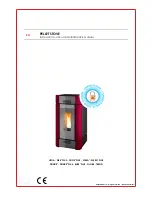
Page 26
7033-277I
July 7, 2011
R
3100 Wood Stove Series (ACC)
2. Second Stage
The next stage of burning, the secondary stage, is the period
when the wood gives off flammable gases which burn above
the fuel with bright flames. During this stage of burning it is
very important that the flames be maintained and not allowed
to go out. This will ensure the cleanest possible fire. If the
flames tend to go out, it is set too low for your burning condi
-
tions. The air control located at the upper right hand corner
is used to adjust for burn rates. This is called the Burn Rate
Air Control.
Figure 26.1.
3. Final Stage
T
he final stage of burning is the charcoal stage. This occurs
when the flammable gases have been mostly burned and only
charcoal remains. This is a naturally clean portion of the burn.
The coals burn with hot blue flames.
It is very important to reload your appliance while enough
lively hot coals remain in order to provide the amount of heat
needed to dry and rekindle the next load of wood. It is best
to open the Burn Rate Air and Start-Up Air Controls
before
reloading
. This livens up the coalbed and reduces excessive
emissions (opacity/smoke). Open door slowly so that ash or
smoke does not exit appliance through opening. You should
also break up any large chunks and distribute the coals so
that the new wood is laid on hot coals.
Air quality is important to all of us, and if we choose to use
wood to heat our homes we should do so responsibly. To do
this we need to learn to burn our stoves in the cleanest way
possible. Doing this will allow us to continue using our wood
stoves for many years to come.
1. Start-Up Air Control
The Start-Up Air Control has two primary functions. The
first function is to activate the Automatic Combustion Control
system (ACC). This function is performed by sliding the con
-
trol all the way back until it stops at the “HI” indicator on the
label and then pulling forward to the front of the stove until
it stops. This activates the ACC system and opens the front
air channel and allows air to enter the front of the stove for
approximately 25 minutes. The front air channel gradually
shuts down until it is completely closed at the end of the 25
minutes. The fire is now controlled by the air supplied by the
Burn Rate Air Control. This function should be performed
each time you reload the stove.
Figure 26.1.
D. Automatic Combustion Control (ACC)
Figure 26.1
HIGH
MED
LOW
Burn Rate
Air Control
Start-Up
Air Control
E. Air Controls
Typically, when you build a fire, you open the air controls fully
and monitor the fire to prevent it from going into an overfire
situation and/or burning your wood up too quickly before you
shut down the air controls to the desired burn rate. With the
Automatic Combustion Control (ACC) system, you do not
have to continually monitor the fire. Once you set the ACC
system it will control the fire for you. Follow the instructions
below to learn how to operate your stove with ease.
Manual
Timer (ACC)
Shut Down
Pull Forward
to Shut
Do
wn
Figure 26.2
The second function of the Start-Up Air Control is operation
of the rear air system. The rear air is used primarily during
a High Burn Rate. However, in some instances rear air is
desired during normal operation to help with combustion of
fuel towards the back of the firebox particularly when burning
hardwoods. The rear air is controlled independently from the
ACC system. Slide the Start-Up Air Control between the first
and third marker as indicated on the label to allow rear air to
enter the firebox.
Figure 26.1.
2. Manual Timer Over-Ride
If you need to shut the ACC system off before it shuts itself
off after 25 minutes (i.e. overfire situation), reach down to
the bottom right rear corner and pull the lever toward you.
Figure 26.2.
















































